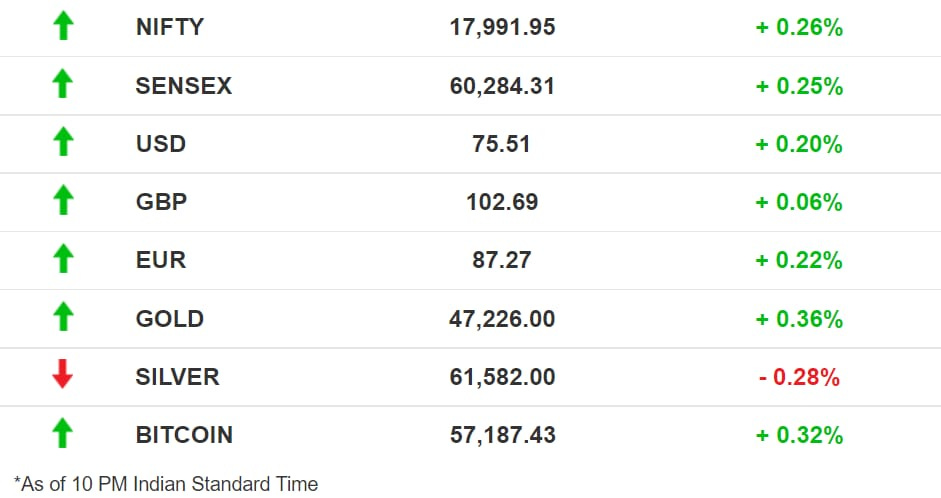You ready for Fortnite the film?
Also in today’s edition: Facebook bends the knee, TakaTak x Moj, China down but India up
Good morning! We’re always amused with crypto pump and dump schemes. Here’s what happened. CoinDesk published a story about the setting up of a UAE-based blockchain and crypto fund. Everyone was excited. Cryptocurrencies, all of them, soared. Then CoinDesk sheepishly apologised and pulled the story. It seems the fund was imaginary. Prices promptly fell. Someone, somewhere made a lot of money.
Btw, we’ve got a new podcast going. It drops every weekday at 5-ish PM. Give us a try. Subscribe, turn on notifications, and give us a shoutout on social media.
The Market Signal

Stocks: Benchmark indices inched higher to register fresh record closes. Among the sectoral indices, Auto continued its rally and was joined by all others except for IT. Interestingly, Foreign Institutional Investors were net sellers for the sixth consecutive trading session, pulling out ₹278 crore. Domestic Institutional Investors were also net sellers, pulling out ₹741 crore.
The Brief Facebook Retreat

With the regulatory gaze firmly on Facebook globally, the company says it will stop linking users’ Instagram and Facebook accounts without their consent. This, Facebook claims, will improve user privacy and “is consistent with evolving advertising, privacy, and regulatory environments”.
What does this mean? Simple. If your Facebook and Instagram accounts aren’t linked via the Accounts Center, the company will consider you as distinct users on the platforms. Until yesterday, if you logged on to the platforms from the same device or with the same login (email), you were counted as a single user.
Upping the ante: Meanwhile, Europe is turning the heat on social media platforms such as Facebook and Google with measures to prevent misuse of microtargeting. A draft proposal now requires the companies to disclose detailed information on political advertising, especially around “how much is spent on particular campaigns, who is the buyer and whether the ad was amplified by an algorithm”.
In A First, Sebi Bans A Rating Agency
Miffed with a series of debt defaults over the past four years, the Securities and Exchange Board of India (SEBI) is tightening the screws on credit rating agencies (CRAs). The markets regulator is set to cancel the license of Brickwork Ratings. It will also ban two former senior employees at Care Ratings.
Why? SEBI’s investigations have found that rating committees at CRAs such as Brickwork lack independence and sometimes eschew standard procedures. Managements collude with these agencies to present a wrong picture of companies’ liquidity position.
Coming on strong: The ratings business is built on a fundamental contradiction: companies that CRAs rate are also their source of revenues. CRAs’ role has attracted scrutiny every time a company defaults on highly rated debt, often triggering financial crises. SEBI is looking to reduce events such as the IL&FS debacle in 2018 and the more recent Essel group default. In both cases rating agencies had failed to warn investors before the event.
The Post-TikTok Era Is Here

There it is. Consolidation has begun in the Indian short video market. Sharechat, which owns short-video platform Moj, is said to be in talks to buy Times Internet’s MX TakaTak for an undisclosed amount, Mint newspaper reported citing unnamed sources.
Both the companies have a common backer in Chinese behemoth Tencent.
In TikTok’s wake: Last year, TikTok, the undisputed short video app leader globally, was banned in India. More than 17 apps sprung up overnight to fill the void and capture its orphaned user base of 300 million users. More than a year later, the top four — Moj, Josh, MX TakaTak, and Glance Roposo — were still vying for the top spot. Some of the others bowed out.
Global players such as YouTube and Instagram suffer from class issues. And Snap seems to be on the surge in India, especially among younger users.
The Signal
We have written before that dominating the short video market involves four Cs: capital, content, creators, and copyright. The first buys the other three. VerSe Innovation, the parent company of Josh and Dailyhunt, has already raised $650 million in 2021. Moj’s parent Mohalla Tech too has raised $647 million this year. But none of them have the X-factor that enabled TikTok to become a world leader with over a billion users.
Having understood that money alone is not enough — the biggest of them all, Josh, has only about 54 million daily active users — they are trying out the next best strategy, consolidation. Although that has worked in other industries, that may not be enough in the crowdsourced content industry where audience loyalty is split between creators and the platform. Creators often find their followers dwindling when they switch platforms. Platforms too see users desert them when star creators move out.
Epic’s Mortal Kombat
Its ongoing legal battles with Apple and Google have restricted Fortnite-maker Epic’s growth on mobile devices. So it’s looking for loot elsewhere. Rumours are swirling ($) around that it may airdrop into the scripted-programming scene i.e. TV shows and movies.
Be-witched: Nowadays it’s a route well paved by many franchises that have successfully made the transition from games to script. Some pioneers from the ‘90s such as Streetfighter, Mortal Kombat, and Lara Croft: Tomb Raider were hit or miss. But of late, they’ve been making the leap with greater success. Sonic the Hedgehog raked in nearly $320 million, while The Witcher (at least then) was Netflix Originals’ most-viewed season debut.
Squad game: A Fortnite movie may well be in the offing as countless collaborations have helped spread its roots deep into the entertainment industry. From Marvel and DC to Disney, Epic has teamed up with everyone. It also has three former Lucas Films executives on board who have worked on franchises such as Star Wars. It also regularly hosts short film festivals, and has a foot in the door with certain audiences.
PS: Reed Hastings wasn’t entirely wrong.
Thumbs Down For China, Up For India

President Xi Jinping’s crackdown on Chinese tech companies has shifted the course of private capital flows from that country to neighbouring India, the dean of a top diplomacy school has argued in Foreign Policy magazine.
Shifting flows: Venture capital investments in Chinese startups fell from $17.3 billion in June to $4.8 billion the next month while those in Indian counterparts went up from $1.6 billion to about $8 billion. This when capital flows into startups in China were 10 times that of those into India in January-March, 2021.
Private equity firm Tiger Global has ramped up investments into Indian start-ups, 25 at last count. Japanese Softbank has halted China investments but said it would put $4 billion in Indian companies this year.
Risky bet: Yet, Bhaskar Chakravorty, dean of global business at Tufts University’s Fletcher School of Law and Diplomacy, contends that India is an alternative but not the ideal destination for investors. He points to scaling up in the price-conscious country, lack of appetite from big firms to buy small ones, difficulty in exiting through IPOs, and regulatory uncertainties among key risk factors.
What Else Made The Signal?
VI lifeline: A few months ago, when he stepped down as chairman, Kumar Mangalam Birla was even willing to give up his stake in Vodafone Idea. Now Birla may pump in his own capital into distressed Vodafone Idea, although likely less than the rumoured ₹10,000 crore.
Small leeway: Multinational banks operating in India will be allowed to store some data such as customer names, addresses, and limited KYC details on overseas servers.
In-cred-ible: A TechCrunch report claims that fintech startup CRED is seeking funding at a $5.5 billion valuation.
iReady: Apple has announced a hardware event for October 18, where it’s expected to launch a pair of new MacBooks, a redesigned higher-end Mac Mini, and possibly a pair of third-generation AirPods.
Truce: After a year-long legal battle and a botched sale of assets to Reliance, the Future Group may negotiate with Amazon once the Singapore International Arbitration Centre (SIAC) delivers its initial rulings this month.
That was kwik: Following a round of ESOP sales, Mobikwik’s valuation has jumped from $720 million in May to $1 billion now, ahead of its IPO.
Dear neighbour: Swiggy is set to test the waters of social commerce with the launch of group buying for groceries.
FWIW

Gifts of secrecy: As with a lot of bungled presidential pursuits, it turns out that former president and failed casino owner Donald Trump’s administration also messed up receiving gifts. From Jared Kushner holding on to two swords and a dagger from the Saudis, which were unaccounted and unpaid for until after he left office, to former second lady Karen Pence taking two gold-toned place cards, a bunch of exchanges overrode the country’s code of conduct on the same.
The Matrix wins: Who isn’t pumped about The Matrix Resurrections? The cast and crew of Venom: Let There Be Carnage. Hardy's comic book sequel film had to readjust a number of its filming sequences because the Keanu Reeves-starrer was shooting at the same location in San Francisco and took up much of the space.
Embracing the rainbow: Henceforth D may as well stand for diversity in DC Comics. The publisher has announced that Superman’s son, Jon Kent, is bisexual. While other comic book characters have come out of the closet in the past, including DC’s Robin and Marvel’s Captain America, this will perhaps be one of the most popular additions to the fictional LGBTQ+ community.
Correction: This story has been updated to reflect that Gaana Hotshots is not functional.
Want to advertise with us? We’d love to hear from you.
Write to us here for feedback on The Signal.



